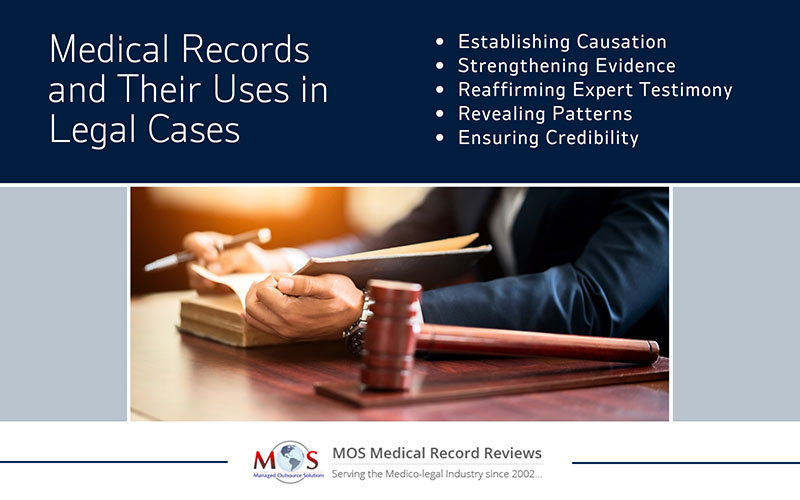A medical record, which is a documented account of an individual’s health history, plays a crucial role in various legal proceedings. These records serve as crucial evidence in cases involving medical malpractice, workplace accident or personal injury. They are used to connect the dots-using dates, communication & actions relevant to the plaintiff’s medical condition.
Besides this, medical records also contain details about the drugs/treatment/investigation prescribed as well as who is making the record and when. And therefore, the way these records are interpreted in court can make or break a case. In this blog, we shall discover the significance and impact of medical records in the outcome of a case, challenges associated and best practices to effectively leverage these records.
Significance of Medical Records
Medical records, being a comprehensive health repository of an individual, can present an unbiased account of his/her medical history and condition, which can help in:
- Establishing the Case: In cases involving personal injury or workplace accidents, medical records act as a bridge that connects the incident to the injuries sustained. This is important to the plaintiff in corroborating his/her claim that the injuries occurred as a direct result of the accident/workplace exposure.
- Evaluating Damages: Medical records enable an assessment of the health conditions mentioned, which can quantify both physical and emotional suffering, especially in malpractice cases, thereby adjudicating on the amount of compensation to be rewarded.
- Ensuring Credibility: A well-maintained record can affirm claims made by plaintiffs, corroborating the expert opinions and hence, validating their testimony.
Impact of Medical Records on Case Outcomes
The quality of the medical record decides the outcome of the case. The following are the impacts of medical records:
- Solidifying Evidence: An accurate medical record is solid documentation that can be used to support a plaintiff’s claim, making it difficult for the defendant to dispute the extent of injury and eventually, the case.
- Disclosing Patterns: Medical records can reveal patterns that support mistreatment or neglect, especially in cases involving elderly or child protection, where instances of abuse/inadequate care can be on the higher side.
- Enhancing Expert Testimony: Medical experts heavily rely on records to provide testimony, which highlights the severity of the injury, timeline of the incident and other vital details. These enable the case to be valid and strong in court.
Challenges in Using Medical Records
While medical records are an inevitable aspect in a legal proceeding, there are several challenges that arise in using them properly:
- Privacy Concerns: Medical records hold private, sensitive patient information and hence accessing them requires HIPAA compliance. Failure to follow protocol can compromise patient confidentiality and attract legal penalties.
- Lack of Medical Expertise: Legal professionals often lack the medical expertise to translate the medical jargon involved. Misinterpretation of medical facts can weaken the case and even lead to legal complications.
- Data Pileup: The amount of data legal professionals have to sift through to locate relevant information is a laborious task in itself. This can be overwhelming for them, leading to inconsistencies and missing details, which can challenge the validity of the records.
Best Practices for Using Medical Records
It is important that medical records are accurate to ensure their effectiveness in legal proceedings. Given below are some of the best practices that can be followed:
- Ensure Accuracy and Consistency: Verify records and confirm they are free of any inconsistencies or errors as it increases the credibility. Also, legal teams should promptly request for missing documentation and clarifications, if any.
- Create Medical Case Summary: Summarizing medical records can help attorneys highlight key information, simplify expert testimony and thereby strengthen the case in their favor.
- Adhere to Guidelines/Protocols: Follow HIPAA and other privacy regulations while using medical records in court. Make sure to redact sensitive information and obtain consent wherever necessary.
- Make use of Medical Record Review specialists: It would be difficult for attorneys or law firms to handle all the above. Therefore, it is advised to seek help from medical record retrieval firms that can accurately evaluate, summarize and simplify complex terminologies.
Medical records are one of the significant pillars that backs a legal case involving personal health. They must have clear, accurate, comprehensive, concise, objective, up-to-date, and legible documentation of patient care. They are generally admissible at a trial, and a good medical record can effectively communicate the patient’s status and progress in therapy. They have a role to play at every stage of the litigation process.
Therefore, by understanding the intricacies in the medical records with the support of medical claims review services, legal professionals can harness this invaluable resource to advocate for their clients effectively and ensure a fair and just resolution in legal cases involving healthcare and personal well-being.
Looking for Assistance with Medical Record Review for Your Case?
Our team will deliver expert record summaries and key insights empowering you with reliable, ready-to-use information!





